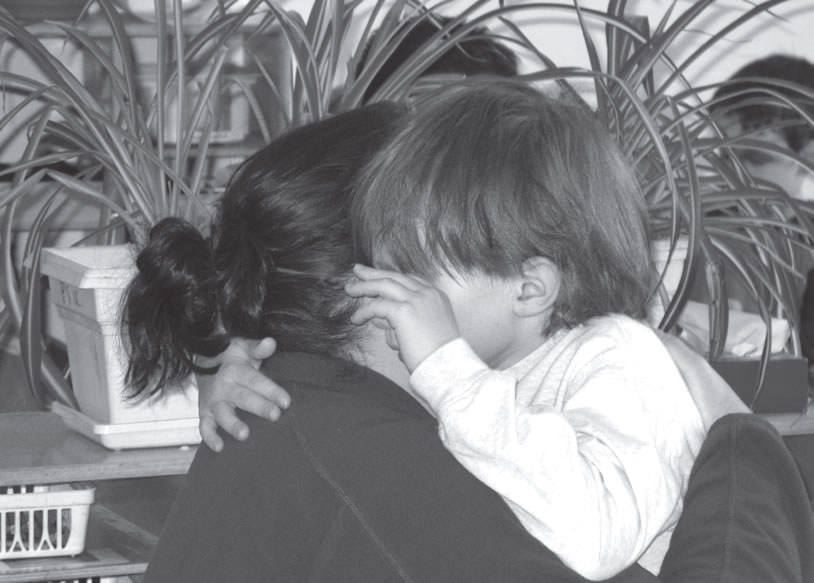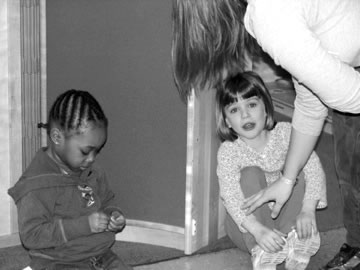Children, including infants and toddlers, are not too young to have mental health problems. Adults who work with children recognize that emotional wellness lays the foundation for learning and positive well being.

Emotional wellness can be described as the developing capacity of children (birth through age eight) to: experience, regulate, and express emotion; form close, secure, interpersonal relationships; and explore the environment and learn - all in the cultural context of family and community. Emotional wellness might also be called mental health, emotional intelligence, relationships for learning, and social/emotional development.
The human connection
Research illustrates that human connection is the active ingredient fueling a child's development. Before children learn their letters, numbers, or how to share, they must experience positive, nurturing interactions to support future academic success and future healthy development. With careful attention, early learning professionals can provide plans that successfully support emotional wellness through promotion, prevention, and intervention.
"Relationships engage children in the human community in ways that help them define who they are, what they can become, and how and why they are important to other people."- National Scientific Council on the Developing Child, Young Children Develop in an Environment of Relationships, Summer 2004
Promotion
Build loving, responsive relationships -
Hold and sing to infants, get down on the floor and play with toddlers, and talk and listen to preschoolers carefully.
Demonstrate problem solving skills -
Comfort infants while talking to them, use role play demonstrating words with toddlers, and facilitate group discussions that guide problem solving skills with preschoolers.
Enlighten parents and others -
Share articles and information on research and current emotional wellness development.
Provide emotionally supportive environments -
Offer positive emotional expectations such as helping each other and reminding children that we are a community that works together.
Use project and experience based learning -
Project work encourages children to collaborate, plan, solve problems, and use socially and emotionally intelligent work.
Be aware of varying temperaments -
Variations in temperament means each child may respond differently to different situations. Recognize your reaction and understanding of different temperaments.
Understand culture plays a role -
Each family has their own unique set of ideas regarding their child's emotional and social development. Discuss these with families.
Prevention
Prevent missed opportunities to assess emotional wellness -
Use well suited observation, assessment, and screening tools to identify and document any difficulties, progress, and success.
Prevent unrealistic expectations -
Know what to expect based on concrete knowledge of child development and current best practices.
Prevent a lack of communication with all involved -
Plan time to share strategies and information together. Request information from the parent to better understand their child, such as how their child likes to be comforted.
Avoid escalated situations -
Develop action plans to set quickly into place for all levels of concern.
Intervention
 Be well aware of interventions services, such as mental health and child welfare agencies, early intervention programs, and clinical intervention services for high risk situations.
Be well aware of interventions services, such as mental health and child welfare agencies, early intervention programs, and clinical intervention services for high risk situations.
Build successful collaborations -
Provide documented information to the intervention service program to provide a comprehensive picture of the child's needs. Be sure all adults involved have the information they need, have access to communication with one another, and use follow up strategies.
Get help -
With increasing challenges, it's important to recognize our own emotional and social needs: connect with others, seek support and professional guidance when needed.
References:
-
Zero To Three: National Center for Infants, Toddlers and Families, Tips on Nurturing Your Child's Social-Emotional Development, 2009.
-
National Scientific Council on the Developing Child, Children's emotional development is built into the architecture of their brains (2004), Working Paper No.2.
-
National Scientific Council on the Developing Child, Young Children Develop in an Environment of Relationships, Summer 2004
-
Strategies to Support the Emotional Wellness of Children, Families, and Staff: Findings from a Head start Mental Health Task Force, Education Development Center, Inc. 2002
Tips 13-3


